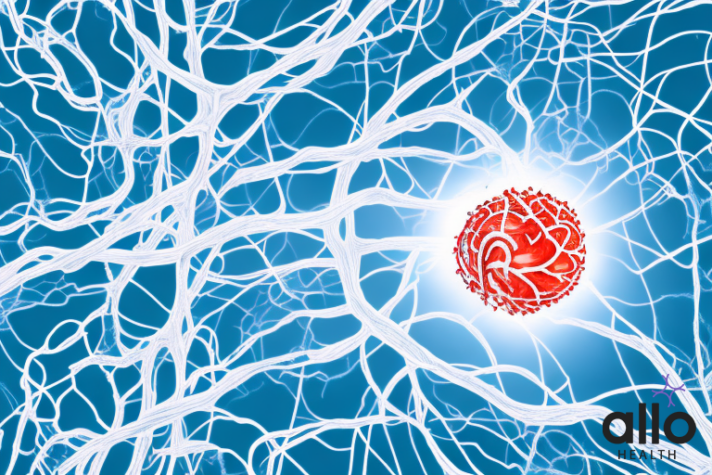The Link Between Calcium and Erectile Dysfunction

Allo Health is dedicated to personalized well-being, offering support and trusted information tailored to individual health goals. The platform emphasizes human-generated content, led by a distinguished medical team of experts, including physicians and sexual health specialists. Their commitment to credibility involves rigorous fact-checking, authoritative research, and continuous updates to ensure accurate, up-to-date information. Allo Health's unique approach goes beyond conventional platforms, providing expert-led insights and a continuous commitment to excellence, with user feedback playing a crucial role in shaping the platform's authoritative voice.

Dr. Raj. R holds an undergraduate medical degree from the Philippines, and has a bachelors background in Psychology. His experience working in the field of urology further brought his interest forward in working towards his passion of understanding the science of attraction, intimacy, sex and relationships. A key motto he practices by remains unprejudiced and non-judgemental care.
Why This Was Upated?
Our experts continually monitor the health and wellness space, and we update our articles when new information became available.
Updated on 17 April, 2024
- Article was updated as part of our commitment to diversity, equity, and inclusion.

"The following blog article provides general information and insights on various topics. However, it is important to note that the information presented is not intended as professional advice in any specific field or area. The content of this blog is for general educational and informational purposes only.
Book consultation
The content should not be interpreted as endorsement, recommendation, or guarantee of any product, service, or information mentioned. Readers are solely responsible for the decisions and actions they take based on the information provided in this blog. It is essential to exercise individual judgment, critical thinking, and personal responsibility when applying or implementing any information or suggestions discussed in the blog."
Erectile dysfunction (ED) is a common condition that affects millions of men around the world. There are a variety of factors that can contribute to ED, including age, health conditions, and lifestyle. But one often overlooked factor in ED is calcium intake. Recent studies have shown a clear link between calcium and erectile dysfunction, suggesting that maintaining healthy levels of calcium in the body can be beneficial for sexual function.
What Is Calcium?
Calcium is a chemical element with the symbol Ca and atomic number 20. It is a soft gray alkaline earth metal that is the fifth-most abundant element in Earth’s crust and essential for various biological processes. Here are some key details about calcium:
- Chemical Properties:
- Symbol: Ca
- Atomic Number: 20
- Atomic Mass: 40.08 u (unified atomic mass units)
- Electron Configuration: [Ar] 4s²
- Group: Alkaline earth metal (Group 2)
- Period: Period 4
- Physical Properties:
- State at Room Temperature: Solid
- Color: Silvery-white
- Density: 1.54 g/cm³
- Melting Point: 842°C (1548°F)
- Boiling Point: 1494°C (2721°F)
- Occurrence:
- Calcium is the fifth most abundant element in Earth’s crust, and it is commonly found in minerals like limestone, gypsum, and fluorite.
- It is also present in various types of rocks, soils, and in the oceans.
- Biological Importance:
- Calcium is crucial for living organisms, playing a fundamental role in many biological processes.
- It is a key component of bones and teeth, providing structural support and strength.
- Calcium ions (Ca²⁺) act as secondary messengers in cell signaling, playing a role in muscle contraction, nerve transmission, and other cellular processes.
- Blood clotting and various enzymatic reactions are dependent on calcium.
- Dietary Importance:
- Calcium is an essential nutrient for humans, and it is important to maintain adequate levels for bone health.
- Dairy products, green leafy vegetables, nuts, and fortified foods are common dietary sources of calcium.
- Industrial Applications:
- Calcium compounds are widely used in various industries. For example, calcium carbonate is used in the production of cement, chalk, and marble.
- Calcium oxide (quicklime) and calcium hydroxide (slaked lime) have applications in construction, agriculture, and water treatment.
- Chemical Reactivity:
- Calcium is a reactive metal, and it reacts readily with water to form calcium hydroxide and hydrogen gas.
- It also reacts with oxygen to form a white oxide coating, protecting the metal from further oxidation.
- Isotopes:
- Calcium has several isotopes, with calcium-40 being the most abundant (about 96.94% natural abundance).
- Calcium-41 is a stable isotope and is used in geological dating.
In summary, calcium is a versatile element with both biological and industrial significance, and its presence is vital for various essential functions in living organisms and numerous applications in different industries.

Role Of Calcium
Calcium plays a crucial role in various biological processes, and its presence is essential for the proper functioning of living organisms. Here are detailed explanations of the key roles of calcium:
- Structural Role in Bones and Teeth:
- Calcium is a major component of bones and teeth in the form of hydroxyapatite crystals.
- It provides structural support, strength, and rigidity to the skeletal system, contributing to overall body stability.
- Cell Signaling and Communication:
- Calcium ions (Ca²⁺) serve as secondary messengers in cell signaling pathways.
- Changes in calcium concentration within the cell regulate many cellular processes, including muscle contraction, nerve transmission, and gene expression.
- Muscle Contraction:
- Calcium is essential for muscle contraction. When a nerve signal reaches a muscle cell, it triggers the release of calcium ions from the sarcoplasmic reticulum.
- The binding of calcium to proteins like troponin allows the contraction of muscle fibers by facilitating the interaction between actin and myosin.
- Nerve Transmission:
- In nerve cells, calcium ions play a key role in the release of neurotransmitters.
- The influx of calcium into nerve terminals triggers the fusion of vesicles containing neurotransmitters with the cell membrane, leading to the release of neurotransmitters into the synaptic cleft.
- Blood Clotting:
- Calcium is essential for the blood clotting process, also known as coagulation.
- It is involved in the activation of various clotting factors, leading to the formation of a blood clot to prevent excessive bleeding when there is damage to blood vessels.
- Enzyme Activation:
- Calcium acts as a cofactor for many enzymes, participating in various biochemical reactions.
- Enzymes involved in processes such as blood clotting, digestion, and energy metabolism often require calcium for their proper activation.
- Cell Division and Proliferation:
- Calcium signaling is involved in the regulation of the cell cycle and cell division.
- Changes in intracellular calcium levels influence cell proliferation, differentiation, and programmed cell death (apoptosis).
- Membrane Permeability and Stability:
- Calcium is involved in maintaining the stability and permeability of cell membranes.
- It influences the function of ion channels and transporters, impacting the movement of ions across cell membranes.
- Hormone Secretion:
- Calcium is a critical factor in the secretion of hormones from endocrine glands.
- It participates in the process of exocytosis, facilitating the release of hormones into the bloodstream.
- pH Regulation:
- Calcium ions can act as a buffer, helping to regulate the pH of cellular compartments.
- They interact with other ions to maintain the appropriate pH environment for various cellular processes.
In summary, calcium is a versatile ion that participates in a wide range of biological functions, from providing structural integrity to bones and teeth to playing key roles in cell signaling, muscle contraction, blood clotting, enzyme activation, and many other essential processes in living organisms.
The Link Between Calcium and Sexual Dysfunction
The link between calcium and sexual dysfunction is a complex and multifaceted topic. While calcium is an essential mineral involved in various physiological processes, its direct influence on sexual function is not as straightforward. However, some indirect connections and associations can be explored:
- Vascular Function:
- Calcium is involved in the regulation of vascular tone and smooth muscle contraction. Proper blood flow is crucial for sexual function, and any disruption in vascular function can contribute to sexual dysfunction.
- Calcium ions play a role in the relaxation and contraction of blood vessel walls. Imbalances in calcium levels or signaling pathways may affect blood flow to genital organs, potentially impacting sexual arousal and function.
- Nerve Transmission:
- Calcium is a key player in nerve transmission, and neural pathways are critical for sexual arousal and response.
- Disruptions in calcium channels or signaling within nerve cells may influence the transmission of signals related to sexual stimuli, potentially contributing to sexual dysfunction.
- Hormonal Regulation:
- Calcium is not a direct regulator of sex hormones, but it can indirectly influence hormonal pathways.
- Hormonal imbalances, including those related to calcium-regulated glands such as the parathyroid glands, may have downstream effects on sexual function.
- Mood and Mental Health:
- Calcium plays a role in neurotransmitter release and may indirectly influence mood and mental health.
- Mental health conditions, such as depression or anxiety, are known contributors to sexual dysfunction. Calcium’s role in neurotransmission might have implications for mental well-being, which, in turn, could impact sexual function.
- Medication Interactions:
- Some medications that affect calcium levels or calcium channels may have side effects related to sexual function.
- For example, certain antihypertensive medications that impact calcium channels may have sexual side effects.
- Bone Health and Hormonal Balance:
- Calcium is crucial for bone health, and bone-related concerns may indirectly affect hormonal balance and, consequently, sexual function.
- Conditions like osteoporosis, which involves calcium imbalance, may be associated with hormonal changes that impact sexual health.
When these connections are made, it’s important to remember that the relationship between calcium and sexual dysfunction is often influenced by many factors, including overall health, hormonal balance, mental health, and lifestyle. If a person is experiencing sexual dysfunction, it is recommended to consult a doctor who can do a good assessment, evaluate various programs and provide appropriate advice or treatment. Sexual health is affected by the interaction of physical, mental and social factors, and addressing all of the following concerns should be comprehensive.
The Link Between Calcium and Erectile Dysfunction
As of January 2022, there isn’t substantial scientific evidence directly linking calcium levels to erectile dysfunction (ED). Erectile dysfunction is a complex condition influenced by various factors, including vascular health, hormonal balance, neurological function, and psychological factors. While calcium is an essential mineral involved in numerous physiological processes, its specific role in the development or prevention of erectile dysfunction is not well-established. However, some indirect associations and considerations are worth exploring:
- Vascular Health:
- Calcium is involved in regulating vascular tone and smooth muscle contraction, including the smooth muscle within blood vessels. Proper blood flow is crucial for achieving and maintaining an erection.
- Disorders affecting calcium channels or signaling pathways may indirectly impact vascular health and blood flow to the genital area, potentially contributing to ED.
- Endothelial Function:
- Endothelial cells, which line blood vessels, play a key role in regulating vascular function. Calcium is involved in endothelial cell function.
- Dysfunction of the endothelium can contribute to vascular concerns, which may affect blood flow to the penis and contribute to erectile difficulties.
- Neurological Factors:
- Calcium is vital for nerve transmission, and neurological factors are critical for the initiation and maintenance of erections.
- Disorders affecting calcium channels or signaling within nerve cells may have implications for the neural pathways involved in sexual arousal and erectile function.
- Hormonal Balance:
- While calcium is not a direct regulator of sex hormones, hormonal imbalances can contribute to erectile dysfunction.
- Hormones such as testosterone play a role in sexual function, and disruptions in hormonal balance may impact erectile function indirectly.
- Psychological Factors:
- Psychological factors, including stress and anxiety, can contribute to ED. Calcium’s role in neurotransmitter release may have indirect implications for mood and mental health.
- Chronic stress or anxiety can influence hormonal balance and contribute to sexual dysfunction.
- Medication Interactions:
- Some medications that affect calcium levels or calcium channels may have side effects related to sexual function.
- For example, certain antihypertensive medications that impact calcium channels may have sexual side effects.
It’s crucial to emphasize that ED is a multifactorial condition, and a comprehensive assessment by a healthcare professional is necessary to determine the underlying causes. Lifestyle factors such as diet, exercise, and overall cardiovascular health also play a role in erectile function.
If someone is experiencing symptoms of erectile dysfunction, they should consult with a healthcare provider. The healthcare provider can conduct a thorough evaluation, consider various contributing factors, and recommend appropriate interventions or treatments based on the individual’s specific circumstances.
Most Asked Questions
-
Is thеrе a dirеct link bеtwееn calcium lеvеls and еrеctilе dysfunction?
Whilе calcium is crucial for various bodily functions, dirеct еvidеncе linking its lеvеls to еrеctilе dysfunction is limitеd. Erеctilе dysfunction is a complеx condition influеncеd by factors likе vascular hеalth, hormonal balancе, and psychological wеll-bеing. Calcium's rolе in thеsе procеssеs suggеsts potеntial indirеct associations, but morе rеsеarch is nееdеd to еstablish a dirеct link.
-
Can calcium dеficiеncy contributе to еrеctilе dysfunction?
Calcium dеficiеncy is gеnеrally not idеntifiеd as a dirеct causе of еrеctilе dysfunction. Howеvеr, it may indirеctly impact vascular hеalth and musclе function. Ensuring an adеquatе intakе of calcium through a balancеd diеt is еssеntial for ovеrall hеalth, but addrеssing ED oftеn involvеs considеring a rangе of factors, such as lifеstylе, hormonеs, and psychological wеll-bеing.
-
How doеs calcium affеct blood flow, and can it impact еrеctions?
Calcium plays a rolе in rеgulating vascular tonе and smooth musclе contraction. Propеr blood flow is crucial for achiеving and maintaining an еrеction. Whilе disordеrs affеcting calcium channеls may impact blood vеssеl function, thе spеcific influеncе of calcium on ED is likеly indirеct. Othеr factors, such as еndothеlial function and ovеrall cardiovascular hеalth, arе also kеy contributors to adеquatе blood flow for еrеctions.
-
Can calcium supplеmеnts improvе еrеctilе dysfunction?
Thеrе is no conclusivе еvidеncе supporting calcium supplеmеnts as a dirеct rеmеdy for еrеctilе dysfunction. ED is a multifacеtеd condition, and its causеs vary. Whilе maintaining a balancеd diеt with sufficiеnt calcium is important for ovеrall hеalth, rеlying solеly on calcium supplеmеnts may not addrеss thе divеrsе factors contributing to ED. Consultation with a hеalthcarе profеssional is crucial to dеtеrminе thе most appropriatе approach.






































